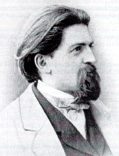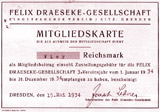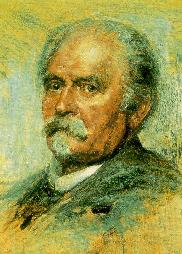About Draeseke: |
|
CDs & recordings: |
|
Draeseke societies: |
|
Draeseke web: |
|
Recent additions: |
|
|

Felix Draeseke Societies
Ever since the death of Felix Draeseke on 26 February 1913 there have been admirers and supporters who have championed his music. The very first centered around his wife Frida Draeseke, who worked tirelessly on behalf of her late husband's music. This group was made up of younger contemporaries and students of the composer. Within five years after Draeseke's death the entire German musical scene had been altered by the consequences of World War I. The aesthetics of the New German School - western music's avant-garde of the mid- and late-nineteenth century - were viewed as causal in the misery following Versailles and young liberals treated musicians and apologians of Wagnerian-Lisztian orientation with particular distrust and malice. Among those who persisted in their efforts on behalf of Draeseke during the unsettled years of the Weimar Republic were the composer's young friend Theodor Röhmeyer and his onetime students Otto zur Nedden and Hermann Stephani. Thus Draeseke joined the ranks of Anton Bruckner, Max Reger, and Ludwig Spohr to enjoy Nazi patronage; an onerous and dubious honor. Roeder's study will never be republished but, whether one likes it or not, it remains the prime source for all beginning scholarly study on Draeseke. All those who use Roeder's work come swiftly to the conclusion that he is not to be trusted: while the facts may be correct, the manner in which they are set down is often misleading, intentionally devious and frequently not only incorrect, but clear fabrication. The worst thing about Roeder's work is the total lack of music examples to clarify analysis. The Felix Draeseke Gesellschaft went out of existence, for all practical purposes, in 1943, with the issuance of its last newsletter. Erich Roeder died in the waning days of the war fulfilling his fanatical belief that senseless sacrifice has value. After the war Hermann Stephani tried to keep the Felix Draeseke Gesellschaft alive, but in the late 1950s the city of Coburg, Draeseke's birthplace, refused both artistic and financial support for the society. For all practical purposes the Felix Draeseke Gesellschaft ceased to exist, but a seed had been planted in German technology during World War II which would allow interest in Draeseke's music to blossom for a new and unbiased generation and, ironically, it began outside of Germany. The use of magnetic tape recording was pioneered in Germany during the Second World War. It was clear that the medium was superior to wire recording and, by the late forties, taping was in. Tape recording in the United States coincided with the LP revolution and one early LP manufacturer, Urania Records, found some way of securing a large number of Reichssender tapes, on which it based much of its early catalog. Among the tapes was the first ever recording of Draeseke's masterpiece, his Symphony No. 3 in C major, Op. 40, the "Symphonia Tragica". The performers were listed as the Berlin Symphony Orchestra conducted by Hermann Desser: the orchestra actually was the Berlin Radio Symphony Orchestra and (only publicly revealed in 1996) "Hermann Desser" was a pseudonym for Heinz Drewes, second only in power in the Nazi Reichsmusikkammer to Peter Raabe. The quality of sound was the equal of most new recordings of the early 1950s, but the record containing Draeseke's "Symphonia Tragica" had little circulation, mainly because the original Urania company changed hands and by late 1957 Urania had expunged most of the Reichssender repertoire from its catalog. Years later, in 1979 the firm Varese Sarabande remastered the Urania tapes (with a couple of unfortunate glitches). Listening to this remastering, it is hard to believe that the original recording was made in 1942! At any rate, this recording afforded a new generation, innocent of bias, a chance to discover the music of Draeseke, and a majority of that new generation was American, as these recordings were available in Europe only by special import. In 1967 the first English language study of Draeseke's music, "The Symphonies of Felix Draeseke", a dissertation in The appearance of this multi-lingual Felix Draeseke website, www.draeseke.org, is the latest manifestation of the efforts of the Internationale Draeseke Gesellschaft (IDG) and International Draeseke Society/ North America (IDS/NA). The Draeseke Societies issue their own recordings on CD on the AK Coburg™ label. Members qualify for a substantial discount on purchase of Society publications and music of Felix Draeseke, Joachim Raff, and others on the Society's CD label: AKCoburg. We welcome you to join. |
© All contents copyright by the Internationale Draeseke Gesellschaft and the International Draeseke Society/North America |


 musicology at the University of Zürich by Alan H. Krueck, appeared in print. In Germany a postwar group of musicians begin to take interest in Draeseke, also of Krueck's generation and even younger: Udo-R. Follert, church music director of Speyer and conductor-at-large, the Bonn musicologist Helmut Loos, and the architect Heinz Ebert of Coburg (a distant relative of the composer) began an association in the late 1970s which led to the formation of the present day Internationale Draeseke Gesellschaft (International Felix Draeseke Society) in 1986; in 1993 the adjunct International Draeseke Society / North America was founded by Alan Krueck. Since then the IDG and IDS/NA have been promoting Draeseke through membership meetings, newsletters, sponsoring concerts and recordings, the reissuing of scores and parts, and the first publications of Draeseke works in manuscript.
musicology at the University of Zürich by Alan H. Krueck, appeared in print. In Germany a postwar group of musicians begin to take interest in Draeseke, also of Krueck's generation and even younger: Udo-R. Follert, church music director of Speyer and conductor-at-large, the Bonn musicologist Helmut Loos, and the architect Heinz Ebert of Coburg (a distant relative of the composer) began an association in the late 1970s which led to the formation of the present day Internationale Draeseke Gesellschaft (International Felix Draeseke Society) in 1986; in 1993 the adjunct International Draeseke Society / North America was founded by Alan Krueck. Since then the IDG and IDS/NA have been promoting Draeseke through membership meetings, newsletters, sponsoring concerts and recordings, the reissuing of scores and parts, and the first publications of Draeseke works in manuscript. 
